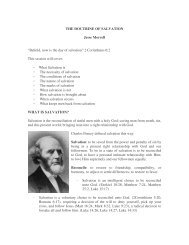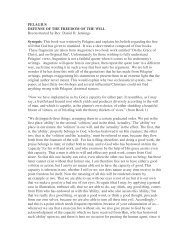Does_God_Take_Away_Free_Will_Jesse_Morrell 2.pdf - PinPoint ...
Does_God_Take_Away_Free_Will_Jesse_Morrell 2.pdf - PinPoint ...
Does_God_Take_Away_Free_Will_Jesse_Morrell 2.pdf - PinPoint ...
You also want an ePaper? Increase the reach of your titles
YUMPU automatically turns print PDFs into web optimized ePapers that Google loves.
51:16-17; Heb 10:6; 10:8). The way that wicked men treated His<br />
Son did not itself please <strong>God</strong> (Mk. 12:6-9; Lk. 20:13-16; 1 Thes.<br />
2:15). The satisfaction (Isa. 53:11) and the pleasure (Isa. 53:10)<br />
which <strong>God</strong> the Father has in the atonement is not sadistic or<br />
personal vindictiveness, but rather this satisfaction and pleasure is<br />
because <strong>God</strong> delights public justice, rejoicing that His laws are<br />
being enforced and upheld through the public demonstration of<br />
Christ’s bloody sacrifice (laws designed for the well-being of all),<br />
and rejoicing and delighting that mercy and pardon can now be<br />
granted to repentant rebels who have violated His moral law. This<br />
is the reason for the satisfaction and pleasure <strong>God</strong> the Father had in<br />
the suffering of the Son (Isa. 53:10-11). Just as punishment is a<br />
means to an end, and not the end itself and therefore <strong>God</strong> rejoices<br />
in justice, not for the pain as an end but as a means, not for its own<br />
sake, but because of what it brings. So also the blood atonement is<br />
a means to an end, and not the end itself, therefore the pleasure<br />
<strong>God</strong> gets from the blood shed is not in the blood as an end, or in<br />
blood shed for its own sake, but as a means to an end, delighting in<br />
it because of what it brings. It’s the mercy and not the sacrifice that<br />
<strong>God</strong> desired (Hos. 6:6; Matt 9:13; 12:7).<br />
2. The atonement does not change <strong>God</strong>, the atonement<br />
changes man (Matt. 1:21; Jn. 1:29; Acts 3:26; Rom. 2:4 (with<br />
Rom. 5:8); 2 Cor. 5:15; Eph. 5:25-27; Col 1:21-23; Titus 2:11-12,<br />
14; Heb. 9:26; 10:10; 1 Pet. 2:24; 1 Jn. 1:7; 3:5; 4:19). The<br />
atonement does not change <strong>God</strong> from being stern, severe, and<br />
angry, to being mild, forgiving, and kind. <strong>God</strong> was merciful,<br />
loving, and forgiving before the atonement was made (Ps. 86:5;<br />
Neh. 9:17; Jonah 4:2; Joel 2:13) which is why He gave us the<br />
atonement (Jn. 3:16; Rom. 5:8). <strong>God</strong> did not have to be reconciled<br />
unto man, but man had to be reconciled unto <strong>God</strong> (Rom. 5:10-11;<br />
11:15; 2 Cor. 5:18-20; Eph. 2:16; Col. 1:20-22), man needed to<br />
change, not <strong>God</strong>. So the atonement changes man, not <strong>God</strong>. <strong>God</strong> is<br />
the same after the atonement as He was before the atonement (Mal.<br />
3:6; Heb. 13:8; Jas 1:17). It was not that the Father wanted to<br />
punish men, seeking personal vengeance, so the Son stepped in to<br />
shed His own blood to satisfy the Fathers personal vindictiveness<br />
wrath, so that now the vindictiveness of <strong>God</strong> is satisfied and<br />
therefore He doesn’t want to punish men anymore. Rather, the<br />
Father wanted to reconcile men and bring men back into a<br />
relationship with Him, He wanted to set aside their punishment<br />
through forgiveness, and therefore He sent His Son to die for their<br />
sin, to change them and bring them to repentance, to make a way<br />
for His wrath to be set aside while also protecting the highest wellbeing<br />
of all, so that their punishment would not be a governmental<br />
necessity anymore. The Lord wanted to set aside the penalty of the<br />
law while upholding the authority, influence, and dignity of the<br />
law at the same time. So the Son changes men on behalf of the<br />
Father, as opposed to the Son changing the Father on behalf of<br />
man. Men are reconciled unto <strong>God</strong>, instead of <strong>God</strong> reconciled unto<br />
men.<br />
3. The atonement is not the exact and literal punishment<br />
that we deserve; blood shed is not the exact and literal payment of<br />
our debt. Nowhere in the Bible is it said that Jesus took the eternal<br />
punishment that we deserve, or paid the eternal debt that we owed,<br />
but the Bible says everywhere that the Savior suffered for our sins<br />
(Lk. 9:22; 17:25; Acts 3:18; 26:23; 2 Tim. 3:12; 1 Pet. 1:11; 2:21;<br />
3:18; 4:1; 4:13; 5:1). The atonement is a substitute for the<br />
punishment that we deserve; blood is a substitute for the debt that<br />
we owe. If Christ were to literally serve our prison sentence, He<br />
would have had to suffer in hell for all of eternity.<br />
This is a dialog I had with a friend:<br />
“What is the punishment that we deserve for our sin?”<br />
“Hell.”<br />
“Did Jesus suffer in eternal hell?”<br />
“No.”<br />
“So did Jesus take our punishment?”<br />
“That’s a good question.”<br />
The atonement consisted in wounding and bruising (Isa.<br />
53:5), agony of soul (Isa. 53:3-4; 10-12; Matt. 26:38; Mk. 14:34)<br />
and the shedding of blood (Lev. 17:11; Heb. 9:22) on behalf of our<br />
sins, iniquities, transgressions, offenses, and crimes. But our<br />
punishment was eternal torment in hell fire (Matt. 25:46; 2 Thes.<br />
1:9; 2 Pet. 2:9; 3:7; Jud. 1:7). The suffering of Christ was a<br />
substitute for the punishment of our sin, the atonement of Calvary<br />
is a substitute for the torments of hell. This substitution is four<br />
fold: Christ is a substitute for sinners, the cross is a substitute for<br />
hell fire, Calvary is a substitute for the lake of fire, and six hours is<br />
a substitute for eternity.


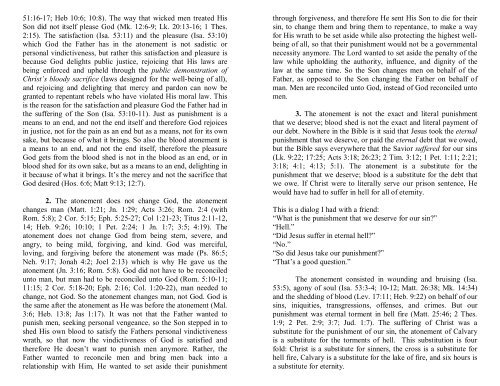


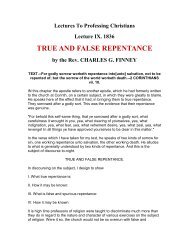
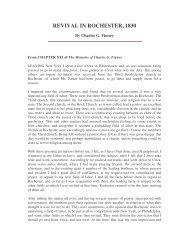

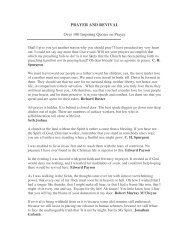
![[PDF] SIX DAYS OR MILLIONS OF YEARS? - Answers in Genesis](https://img.yumpu.com/34887318/1/190x245/pdf-six-days-or-millions-of-years-answers-in-genesis.jpg?quality=85)




